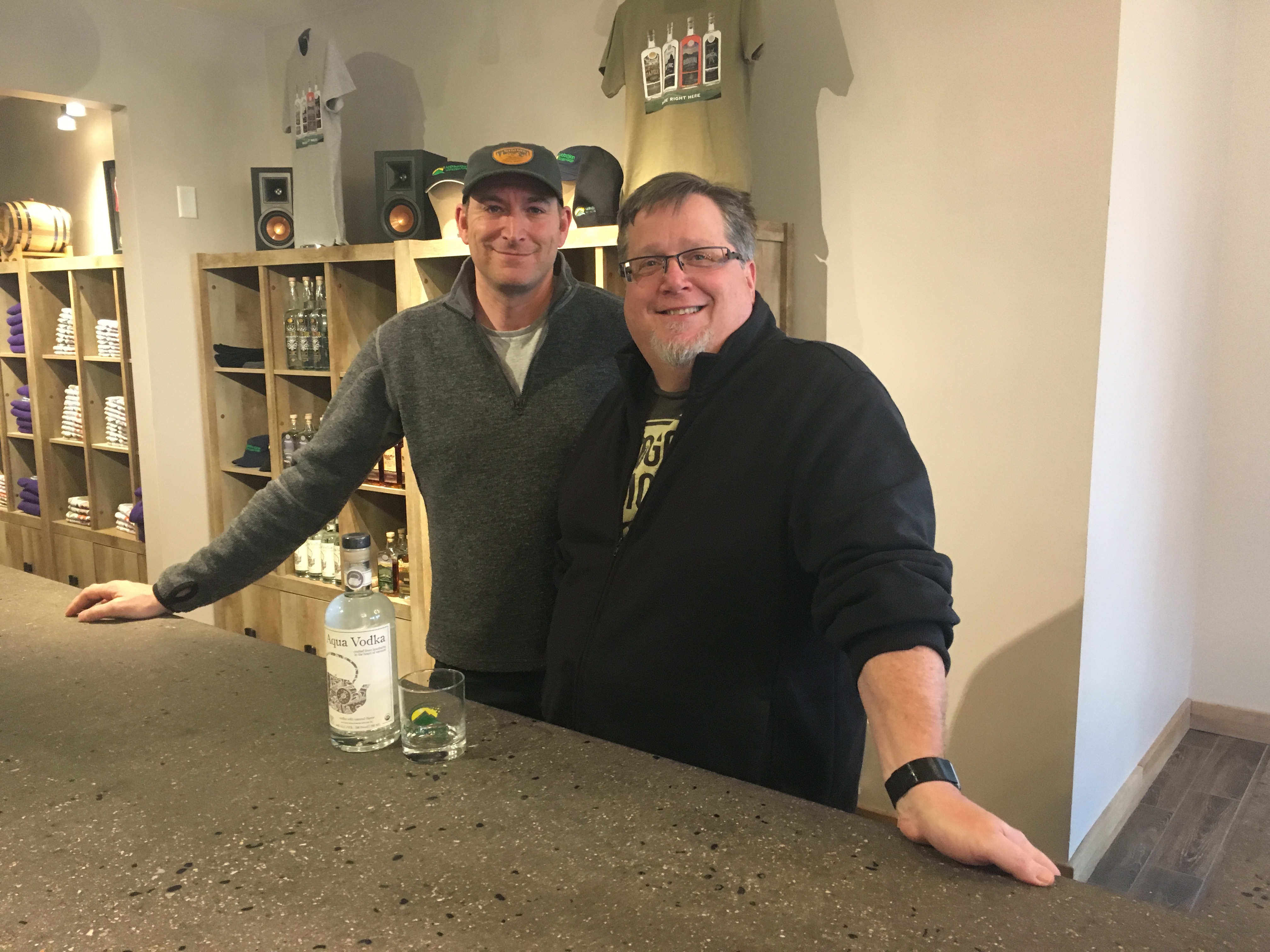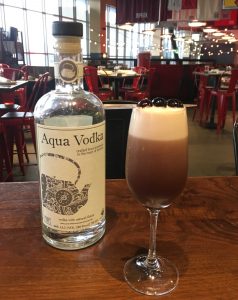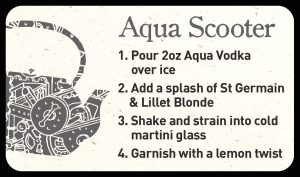Entrepreneurs In Vermont Put Kombucha To “Spirited” Use

Jeff Weaber (L), founder/CEO of Aqua ViTea, and Lars Hubbard (R), co-owner of Appalachian Gap Distillery have partnered up to make Aqua Vodka: a vodka made with alcohol extracted from kombucha. Photo by Eric Shimelonis
Visit the beverage cooler at your grocery store and you’ll find bottle after bottle of kombucha. The increasingly-popular fermented drink is made from tea, sugar, bacteria and yeast.
But now the tart, fizzy, probiotic beverage is making its way somewhere new: behind the bar.
Rebecca Sheir introduces us to neighboring entrepreneurs in Vermont who are putting kombucha to a surprisingly “spirited” use.
In 2009, Jeff Weaber was brewing his organic “Aqua ViTea” kombucha out of his basement, and selling it at farmers markets, co-ops and other stores across Vermont.
One day, who should knock on Weaber’s door but gun-toting agents from the state Department of Liquor Control, and the federal Alcohol and Tobacco Tax and Trade Bureau.

Aqua Vodka is available in venues across Levi’s Stadium, home of the San Francisco 49ers. Here it’s being featured in the signature cocktail, the Aqua Scooter. Credit Aqua Vodka
“And they spent the next four or five hours with me, digging through our process, taking samples, investigating the property, looking for distilling equipment and other things. So it was a very nerve-wracking afternoon,” describes Weaber.
The agents had been studying the burgeoning kombucha market. And in the eyes of the law, some brands of the fermented drink, including Jeff Weaber’s, had alcohol levels that, legally, were “elevated.”
A “non-alchoholic” product need to have an “alchohol by volume”, or ABV, level that is below 0.5%. Some of Weaber’s products had an ABV as high as 2.5%, which is more than some light beers.
Weaber reached out to the Department of Food Science at Cornell, “We started doing a lot of biological work understanding how to manipulate, I guess you’d say, the fermentation to keep the alcohol down.”
A process which is easier said than done.
“Kombucha’s a complex fermentation. It’s got two yeasts and it’s got multiple strands of bacteria and all these other things that when you DNA test, some of them have never been identified before,” Weaber said.
Weaber started experimenting with ways to lower the alcohol level. Meanwhile, his growing company moved to an industrial park in Middlebury. It was there that they began using a machine developed for the wine-industry: one that spins liquid, and uses pressure to extract alcohol.
“So, I realized early on that we were gonna have a byproduct of alcohol. What I didn’t realize was how much we were gonna have.”
Containers full of it, it turns out. And Jeff Weaber didn’t want all this organic, 120-proof alcohol to go to waste.
Luckily, he found the answer 300 yards away. Across the street in the industrial park, was a business with tanks full of alcohol.
Lars Hubbard co-owns Appalachian Gap Distillery. The solar-powered spirits manufacturer prides itself on using interesting local ingredients, from slow-drip coffee to, yes, maple syrup.
Now, the company can add Jeff Weaber’s Aqua ViTea kombucha to that list.

Aqua Vodka can be found throughout Levi’s Stadium, home of the San Francisco 49ers. The “Aqua Scooter” cocktail was recently featured throughout the stadium’s beverage venues. Credit Aqua Vodka
“Jeff came over, and we sat down and talked about the problem they were having, and we decided to do a test batch and see how it worked out,” said Hubbard.
That “test batch” turned into Aqua Vodka: a sweet, fruity, even slightly bitter organic spirit made from Aqua ViTea’s leftover alcohol.
“They ship it over to us at about 60-percent alcohol. And we re-distill it. And then we get about 40-percent of the total alcohol they send to us is good clean ethanol. And so that’s what becomes Aqua Vodka,” said Hubbard. “I confess we’re still tinkering with it. A lot of what we do is just sort of learn by doing, because no one’s ever done this before.”
And as such, the feds didn’t know what to do with it – including how to designate what kind of liquor it was.
“Because we’re making this from a spirit that is already infused with flavor, we can’t actually call it a pure vodka. Because the way it’s defined within the TTB, it’s not vodka,” says Hubbard.
The label says “Vodka with Natural Flavor.” Hubbard says they have to put that “with natural flavor” part because if they don’t, they’d be breaking the law.
But despite the bureaucratic hoops, Jeff Weaber says Aqua Vodka has been received well by the public. You can buy bottles of it in five states, including Vermont and Massachusetts. And Levi’s Stadium — home of the San Francisco 49ers — has featured a signature cocktail made with the spirit.
So, making vodka from kombucha has been mutually beneficial for these across-the-street neighbors. They only wish they had a pipeline between the two spaces to make transporting the liquid easier.
